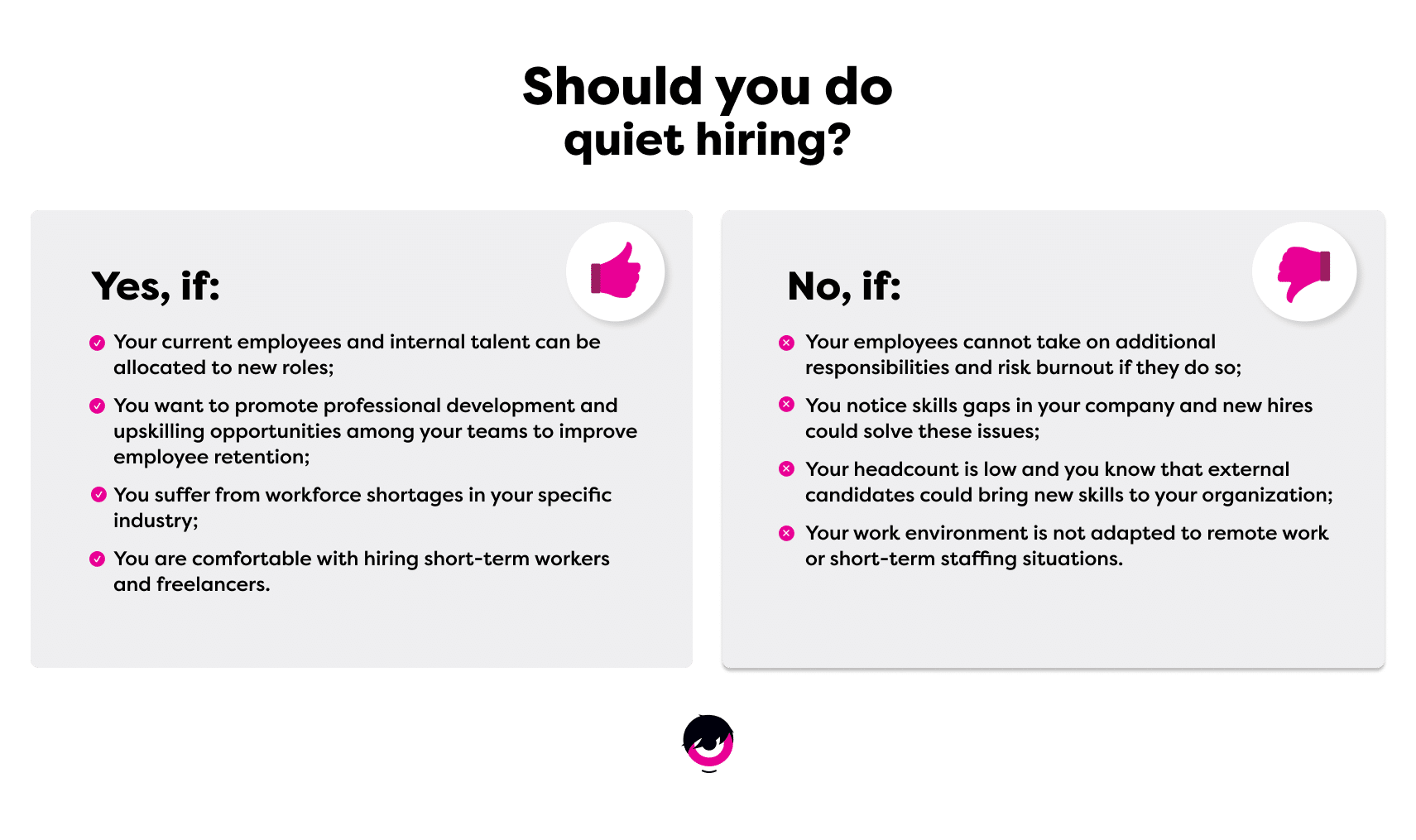In one of our previous articles, we analyzed the best practices for HRs to prevent quiet quitting and bring added value to their employment to ensure their loyalty.
Since quiet quitting grew into a common practice in several industries, quiet hiring became the next workplace trend reshaping the future of work. Read on to learn what quiet hiring entails, its benefits and challenges, and if it’s right for your company.
What Is Quiet Hiring?
Quiet or silent hiring is a recruitment and employment practice where a company conducts the entire hiring process under the radar. Rather than promoting a job opportunity and marketing open positions, talent hunters approach their prospects privately and confidentially. It often leads to in-house promotions and attributing new responsibilities or hiring temporary workers rather than full-time employees.
With quiet hiring, the whole recruitment process is done with a high level of discretion. You can benefit from this approach if you wish to hire your competitors’ employees, onboard new staff without alerting your rivals, and kick off a new business strategy without making it public to the industry speakers.
This practice is most common among tech companies and startups preparing a new initiative they want to keep a secret before launching. Once you get your potential hire’s attention, you can sign a confidentiality agreement and conduct the needed recruitment assessments off the grid, rest assured your ambitions and plans are safe from curious eyes outside the company.
The Benefits of Quiet Hiring
Quiet hiring can be beneficial for you and your business in many ways. Here are the main benefits:
1. Strategic advantage over your competitors
When you keep your hiring activities confidential, you enable the in-house teams to work on important projects or strategies without allowing your competitors to peek into what you are doing.
This will allow you to prepare your next big thing away from the public eye while staying ahead of any industry trends when you launch new products. It also helps keep your ideas and patents isolated from the industry sharks, enabling you to use timing to your advantage and be the first to implement important industry updates.
For example, quiet acquisition comes in handy when you need to hire a CTO (Chief Technology Officer) to guide your company through digital transformation. Every step of the recruitment and onboarding can be kept silent until you have everything set to launch the next rebranded and contemporary version of your firm.
2. Discovering top talents in the industry
Talent hired in the right position can make or break your business. Creative and intelligent individuals who make successful teams are essential for generating ground-breaking ideas and making them come to life.
If your business is within a highly competitive industry, talent hunting is HR’s top priority. A good HR who knows that talent acquisition can shape a company’s success can benefit significantly from quiet hiring practices.
Quiet hiring often involves actively recruiting talent from competitors or industry peers. If an HR discreetly approaches top-performing individuals in other companies, they can offer them a better opportunity and a new workplace.
Quiet hiring also creates opportunities for potential job seekers who may not have otherwise considered leaving their current positions. They could be enticed by a discrete job offer that includes better compensation, career growth prospects, or more alignment with their values.
Once you get new talent on board, the key is to prevent quiet quitting aka keep your promises and make sure to keep your employees happy.
“The best candidates often aren’t broadcasting their next move – they emerge through context. Modern sourcing involves multi-source employee data to extract and automate signals like rapid promotions, industry expertise, certifications, publications, recommendations and more, revealing high-value candidates before they appear on the open market.” – Coresignal, a reliable source of structured B2B datasets
3. Reduced hiring and talent marketing costs
Quiet hiring saves some costs in your budget that you would otherwise spend on HR marketing – posting job listings, paying fees to career websites, building a reputable employer brand, and creating social media campaigns.
Instead, HRs can rely on internal referrals, executive search firms, or niche job platforms to identify potential candidates. This allows them to narrow the pool of applicants to those with specific skills or experiences.
Moreover, you will save some time on writing attractive job descriptions, going through a large number of applications, and conducting extensive interviews. Quiet hiring presents an opportunity to explore out-of-the-box talent acquisition as well as innovative practices such as collaborative hiring when you need the whole team to choose who they want to work with.

Challenges of Quiet Hiring
Quiet hiring presents an opportunity to involve the right people in your project without compromising your company’s secrets in a marketing campaign. However, it comes with a set of challenges you need to consider.
Some may consider the practice to be ethically questionable, especially when you actively target and hire talent from competitors. This can lead to strained relationships between companies and ethical concerns about employee loyalty and confidentiality.
On top of that, you need to be cautious when approaching employees of competitors to avoid legal issues related to non-compete agreements and trade secrets. Violating these agreements can result in legal action against your new hire.
As we’ve mentioned before, quiet hiring exists alongside quiet quitting. An essential practice of any good HR is to conduct regular check-ins with the employees (such as stay interviews, for instance), make sure they are satisfied and fulfilled, and organize activities like employee engagement training programs and exciting team-building activities.
Moreover, quiet hiring is contributing to a more dynamic and fluid job market, where employees are often open to new opportunities, and companies are constantly seeking top talent. While this seems good at first glance, this can also create a climate of uncertainty and competition for skilled workers.
Should You Do Quiet Hiring in 2025?
You should consider quiet hiring if:
- Your current employees and internal talent can be allocated to new roles;
- You want to promote professional development and upskilling opportunities among your teams to improve employee retention;
- You suffer from workforce shortages in your specific industry;
- You are comfortable with hiring short-term workers and freelancers.
Quiet hiring is probably not for you if:
- Your employees cannot take on additional responsibilities and risk burnout if they do so;
- You notice skills gaps in your company and new hires could solve these issues;
- Your headcount is low and you know that external candidates could bring new skills to your organization;
- Your work environment is not adapted to remote work or short-term staffing situations.

Over To You
Quiet hiring as a recruitment strategy can bring many benefits to your company due to high confidentiality level and targeted searches to attract and hire top talent. While you can gain a competitive advantage by employing the best, you should take care of employee onboarding and satisfaction in the workplace to maintain that edge.
Meanwhile, make sure your HR is well-familiarized with the potential ethical and legal concerns that come with quiet hiring and how you can adapt your business to a rapidly evolving job market in the long run.
Looking to hire the best talent in your company?
Discover a flexible Applicant Tracking System and find your next high-performing employee!
Ciara Byrnes spends most of her time reporting on digital marketing for an over-stressed audience of marketers and business owners trying to keep up with the fast pace of change. To center herself, she has become a wellness enthusiast, reaching “highs” like morning yoga on the porch of her family’s summer lake cabin to “lows” like failing to convince herself that wheatgrass is actually yummy.
